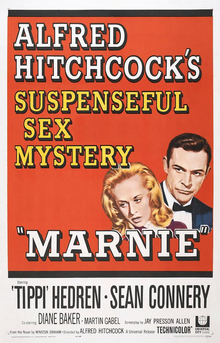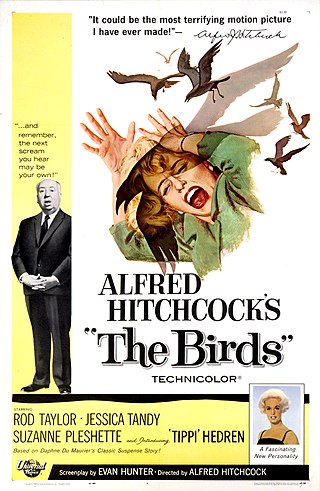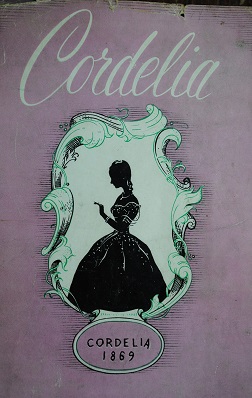
Sir Alfred Joseph Hitchcock was an English film director. He is widely regarded as one of the most influential figures in the history of cinema. In a career spanning six decades, he directed over 50 feature films, many of which are still widely watched and studied today. Known as the "Master of Suspense", Hitchcock became as well known as any of his actors thanks to his many interviews, his cameo appearances in most of his films, and his hosting and producing the television anthology Alfred Hitchcock Presents (1955–65). His films garnered 46 Academy Award nominations, including six wins, although he never won the award for Best Director, despite five nominations.

Suspicion is a 1941 American romantic psychological thriller film noir directed by Alfred Hitchcock, and starring Cary Grant and Joan Fontaine as a married couple. It also features Sir Cedric Hardwicke, Nigel Bruce, Dame May Whitty, Isabel Jeans, Heather Angel, and Leo G. Carroll. Suspicion is based on Francis Iles's novel Before the Fact (1932).
Winston Mawdsley Graham OBE, born Winston Grime, was an English novelist best known for the Poldark series of historical novels set in Cornwall, though he also wrote numerous other works, including contemporary thrillers, period novels, short stories, non-fiction and plays. Winston Graham was the author's pseudonym until he changed his name by deed poll from Grime to Graham on 7 May 1947.

Marnie is a 1964 American psychological thriller film directed by Alfred Hitchcock from a screenplay by Jay Presson Allen, based on the 1961 novel of the same name by Winston Graham. The film stars Tippi Hedren and Sean Connery.

Nathalie Kay "Tippi" Hedren is an American retired actress. Initially a fashion model, appearing on the front covers of Life and Glamour magazines, she became an actress after being discovered by director Alfred Hitchcock while appearing on a television commercial in 1961. Hedren achieved great praise for her work in two of his films, including the suspense-thriller The Birds (1963), for which she won a Golden Globe Award for New Star of the Year, and the psychological drama Marnie (1964). She performed in over 80 films and television shows, including Charlie Chaplin's final film A Countess from Hong Kong (1967), the political satire Citizen Ruth (1996), and the existential comedy I Heart Huckabees (2004). Among other honors, her contributions to world cinema have been recognized with the Jules Verne Award and a star on the Hollywood Walk of Fame.

The Birds is a 1963 American natural horror-thriller film produced and directed by Alfred Hitchcock, released by Universal Pictures and starring Jessica Tandy, Rod Taylor, Suzanne Pleshette, and introducing Tippi Hedren in her film debut. Loosely based on the 1952 short story of the same name by Daphne du Maurier, it focuses on a series of sudden and unexplained violent bird attacks on the people of Bodega Bay, California, over the course of a few days. The screenplay is by Evan Hunter, who was told by Hitchcock to develop new characters and a more elaborate plot while keeping du Maurier's title and concept of unexplained bird attacks.

Anna Lee, MBE was a British actress, labelled by studios "The British Bombshell".

Murder! is a 1930 British thriller film co-written and directed by Alfred Hitchcock and starring Herbert Marshall, Norah Baring and Edward Chapman. Written by Hitchcock, his wife Alma Reville and Walter C. Mycroft, it is based on the 1928 novel Enter Sir John by Clemence Dane and Helen Simpson. It was Hitchcock's third all-talkie film, after Blackmail (1929) and Juno and the Paycock (1930).

Jay Presson Allen was an American screenwriter, playwright, and novelist. Known for her withering wit and sometimes off-color wisecracks, she was one of the few women making a living as a screenwriter at a time when women were a rarity in the profession.

The Walking Stick is a 1970 British crime drama film directed by Eric Till and starring David Hemmings and Samantha Eggar. It was based on the 1967 novel of the same title by Winston Graham.
Tony Lee Moral is a British documentary film maker and writer.

The Ragman's Daughter is a 1972 British romantic crime–drama film directed by Harold Becker and adapted by Alan Sillitoe from his short story of the same name. It was Becker's first film during the 1970s and stars Simon Rouse and, in her screen debut, Victoria Tennant. The film tells the story of the ill-fated love between Tony, a petty thief from a working-class family, and Doris, the daughter of an upwardly mobile scrap dealer.

Diane Hutchinson is a fictional character from the British soap opera Hollyoaks, played by Alex Fletcher. The character made her first appearance on 1 September 2010. Diane was introduced into the series by Hollyoaks' executive producer Paul Marquess, during his rejuvenation of the show. Marquess axed numerous characters and replaced them with new families. Fletcher began filming in June 2010, the same month her casting was publicised. Diane was introduced with her husband, Rob and stepchildren, Sinead and Finn O'Connor. The O'Connors are one of three families that were introduced 2010. Diane is characterised as a "loving wife" and a "devoted stepmum". Fletcher initially hoped that Diane would be likeable, despite her over the top demeanour. Fletcher believed Diane has a good relationship with her step-children and was loathe to portray her as "the wicked stepmother".
Sean Michael O'Connor is an English producer, writer, and director working in theatre, film, television and radio. He was the editor of the long-running BBC radio drama, The Archers from 2013 to 2016 and executive producer of EastEnders from 2016 to 2017.

The Girl is a 2012 British television film directed by Julian Jarrold, written by Gwyneth Hughes and produced by the BBC and HBO Films. The film stars Sienna Miller as Tippi Hedren and Toby Jones as Alfred Hitchcock. It is based on Donald Spoto's 2009 book Spellbound by Beauty: Alfred Hitchcock and His Leading Ladies, which discusses the English film director Hitchcock and the women who played leading roles in his films. The Girl's title was inspired by Hitchcock's alleged nickname for Hedren.

James Nightingale is a fictional character from the British soap opera Hollyoaks, played by Gregory Finnegan. The character made his first on-screen appearance on 12 January 2016. Finnegan's casting was announced in December 2015, and James was billed as a mysterious character and lawyer. His introduction to the show featured him attempting to convince Cindy Cunningham to take legal action against Mac Nightingale, in a bid to secure his assets. Having kept the character's identity concealed, writers implemented a story twist in which James is revealed to be Mac's son. Lysette Anthony was cast to play his mother Marnie Nightingale, a character which James features alongside most. Their on-screen partnership developed them into a trouble making and villainous duo. Writers played on their manipulative manner to the extent that James manages to con the entire Hutchinson family, out of their restaurant "The Hutch".

When Marnie Was There is a novel by British author Joan G. Robinson, first published in 1967 by Collins. The story follows Anna, a young girl who temporarily moves to Norfolk to heal after becoming ill. There she meets a mysterious and headstrong girl named Marnie who lives in a house overlooking the marshes. They develop a secretive relationship they come to cherish. The novel explores themes of alienation, loneliness, and forgiveness in childhood. It received highly positive reviews, praised for its intensity of natural imagery, balance of humour with difficult themes, and emotional weight. The story was adapted to television in 1971 and radio in 2006. In 2014, it was adapted by Studio Ghibli as an animated film of the same name.
Marnie is an opera by Nico Muhly to a libretto by Nicholas Wright based on the 1961 novel by Winston Graham.

Cordelia is a 1949 historical novel by the British writer Winston Graham. He wrote it for the Book of the Month Club and enjoyed commercial success in the United States. It is set in Manchester in the 1860s.















